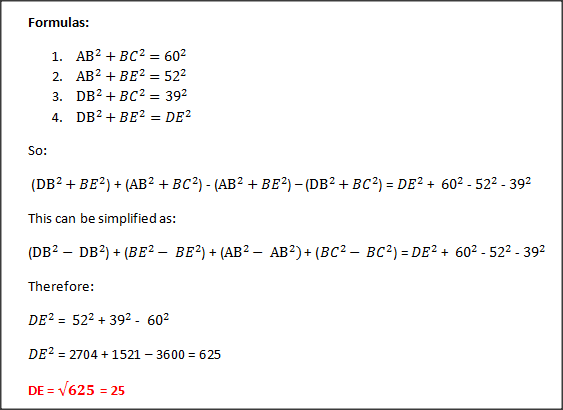Day 17: Three Lengths in a Triangle

A B C has a right angle at B . A C = 6 0 , A E = 5 2 and C D = 3 9 .
Find the length of D E .
This problem is part of the set Advent Calendar 2014 .
The answer is 25.
This section requires Javascript.
You are seeing this because something didn't load right. We suggest you, (a) try
refreshing the page, (b) enabling javascript if it is disabled on your browser and,
finally, (c)
loading the
non-javascript version of this page
. We're sorry about the hassle.
6 solutions
Discussions for this problem are now closed
What's astonishing isn't the solution, it's that all the line segments are integer length.
That is a good observation. In fact when making this problem I selected the numbers so that A B , A D , B E and B C can all be integer lengths too!
let A D = b , E C = a , D B = x , B E = z by the Pythagorean theorem, we can say: ⎩ ⎪ ⎨ ⎪ ⎧ x 2 + ( z + a ) 2 = 3 9 2 z 2 + ( x + b ) 2 = 5 2 2 ( x + b ) 2 + ( z + a ) 2 = 6 0 2 upon expansion, ⎩ ⎪ ⎨ ⎪ ⎧ x 2 + z 2 + 2 z a + a 2 = 3 9 2 − − ( 1 ) x 2 + z 2 + 2 x b + b 2 = 5 2 2 − − ( 2 ) x 2 + z 2 + 2 z a + 2 x b + a 2 + b 2 = 6 0 2 − − ( 3 ) subtract 2 from 3 to get 2 z a + a 2 = 8 9 6 insert it in 1 to get x 2 + z 2 + 8 9 6 = 3 9 2 , x 2 + z 2 = 6 2 5 by the Pythagorean theorem , D E = D B 2 + B E 2 = x 2 + y 2 = 6 2 5 = 2 5
Let BE = x, BD = y, EC = a, AD = b
in triangle ABC (y + b)^2 + (x + a)^2 = 60^2 .......................................(1)
in triangle ABE (y + b)^2 + x^2 = 52^2 .................................................(2)
in triangle DBC (x + a)^2 + y^2 = 39^2 .................................................(3)
Adding (2), (3) and using (1) we get x^2 + y^2 = 52^2 + 39^2 - 60^2 = 625
in triangle DBE DE^2 = x^2 + y^2 = 625
Then DE = 25
Not a high level thinking question but a quite challenging one to get with it.
Firstly looking at the ABC and applying pythagoras theorem in it
[AC^2]=[AB^2 + BC^2]
3600=[AB^2 + BC^2] .........(1)
Now, In triangle ABE,
2704=[AB^2 + BE^2] ...........(2)
Now, In triangle DBC,
1521=[DB^2 + BC^2] ...........(3)
Adding equations 2 and 3 :
4225=[AB^2 + BE^2 + DB^2 + BC^2 ]
4225=[3600 + BE^2 + DB^2] [From 1 ]
[BE^2 + DB^2 ]=625 .......(4)
But,
[BE^2 + DB^2]=[DE^2} ............(5)
[DE^2] = 625
DE=25
Here we got the required answer. ;)
Let BE = a, EC = b, BD = c, and AD = d. By Pythagorean theorem,
(1) (a+b)^2+(c+d)^2 = 60^2;
(2) a^2+(c+d)^2 = 52^2;
(3) (a+b)^2+c^2 = 39^2.
Performing the operation (2)+(3)-(1), we obtain a^2+c^2 = 52^2+39^2-60^2 = 625. Therefore DE = sqrt(a^2+c^2) = 25.

This is a very cool result! Somehow all the equations cancel to give a nice answer.
By Pythagoras' Theorem, A B 2 + B C 2 = 6 0 2 A B 2 + B E 2 = 5 2 2 B D 2 + B C 2 = 3 9 2 Now notice that adding the last two equations and taking away the first shows that: ( A B 2 + B E 2 ) + ( B D 2 + B C 2 ) − ( A B 2 + B C 2 ) = B D 2 + B E 2 = D E 2 Therefore D E 2 = 5 2 2 + 3 9 2 − 6 0 2 = 6 2 5 And so D E = 2 5 .